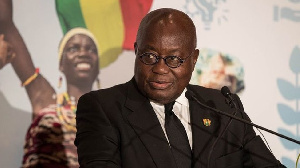 President Nana Addo Dankwa Akufo-Addo
President Nana Addo Dankwa Akufo-Addo
President Nana Ado Dankwa Akufo-Addo has said that his administration will deepen engagement with the private sector to ensure the local economy remains stronger.
Mr Akufo-Addo revealed in his opening remarks at a two-day annual presidential business summit in Accra on Tuesday, September 14 that Ghana is at the moment witnessing single-digit inflation and also strong reserve in Foreign Direct Investments (FDIs).
These, according to him, are signs the economy is bouncing back.
“Low inflation rate, stable currency, strong reserve position in FDI flows are clear indications of our collective desire to restore the Ghanaian economy onto a path of sustained stability and growth.
“We will continue to strengthen and deepen our engagement with the private sector towards realizing this goal,” he said.
The Government Statistician Professor Samuel Kobina Annim had earlier announced that the Year-on-year inflation rate for August stood at 9.7 per cent compared to 9.0 per cent in July.
The month-on-month inflation between July 2021 and August 2021 was 0.3 per cent.
Speaking at a press briefing in Accra, alcoholic beverages were the dominant drivers for the higher rate of inflation in August 2021.
He said food contributed more than half to overall inflation when combined with housing more than two-thirds, and further including transport more than four-fifths.
In the area of FDIs, the Ghana Investment Promotion Centre had also announced that last year, Ghana saw a surge in FDI inflows, recording an impressive 2.6 billion dollars’ worth of inbound investments for the year.
The trend defied the anticipated steep decline in FDI flows as the second wave of COVID 19 infections threatened to cripple the Ghanaian economy.
A report by the United Nations Conference on Trade and Development placed the pandemic-induced decline in global FDI at 42 percent. The fall was however highly uneven across developing regions: -37% in Latin America and the Caribbean, -18% in Africa and -4% in developing countries in Asia.
While Ghana had initially witnessed a plateau in FDI inflows during the first wave of infection and its ensuing lockdowns, investments well along saw a rebound on the back of government policy responses to mitigate the impact of the health pandemic on businesses.
Total investment inflows thus peaked at US$2,796.49 million in 2020, with a total FDI value of US$2,650.97 million for Ghana. The FDI value of US$2,650.97 million illustrates a significant increase of 139.06% over the FDI value of US$1,108.93 million recorded in 2019.
With the considerable inflow of investments, some 279 projects were registered within the year. This comprised 129 newly registered projects, 131 upstream developments and 19 free zones activities -dispersed across eight regions, with Greater Accra registering the highest number of 231 projects. Cumulatively, some 27,110 jobs are expected to be generated from the aforementioned registered projects.
For the year under review, some countries that stood out as the nation’s leading sources of inward investments included, China, the United Kingdom, South Africa, Australia and the Netherlands.